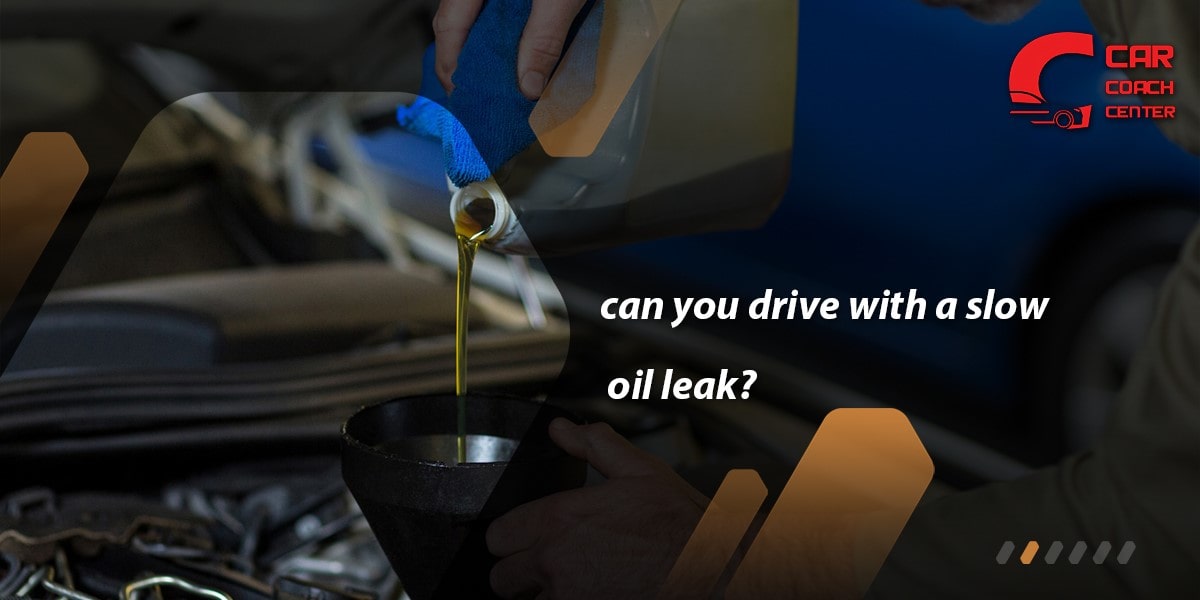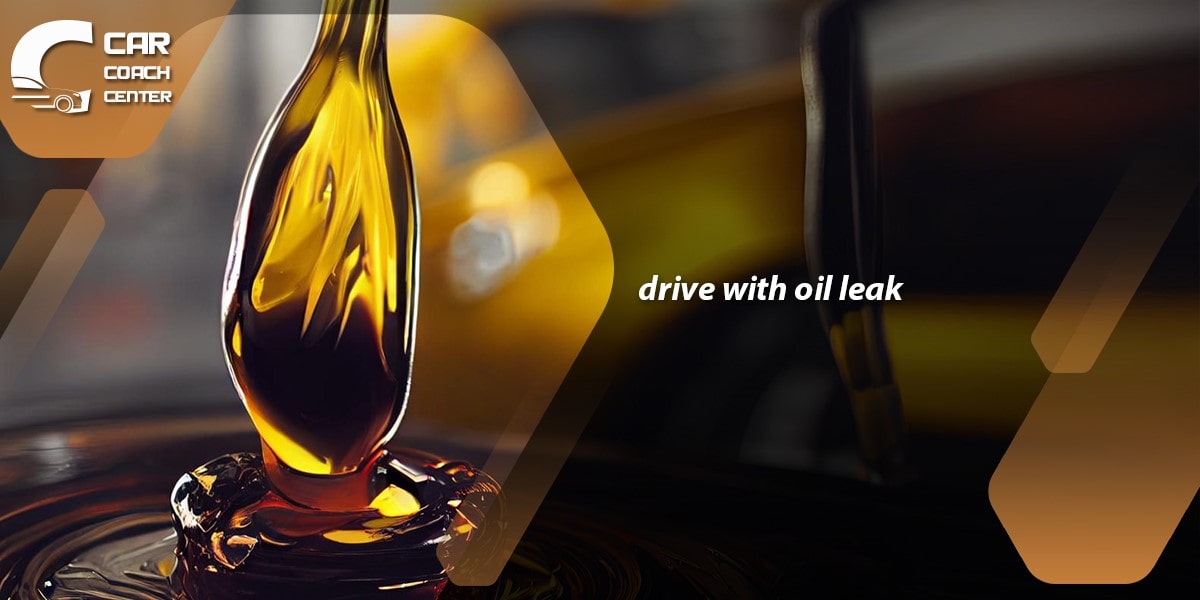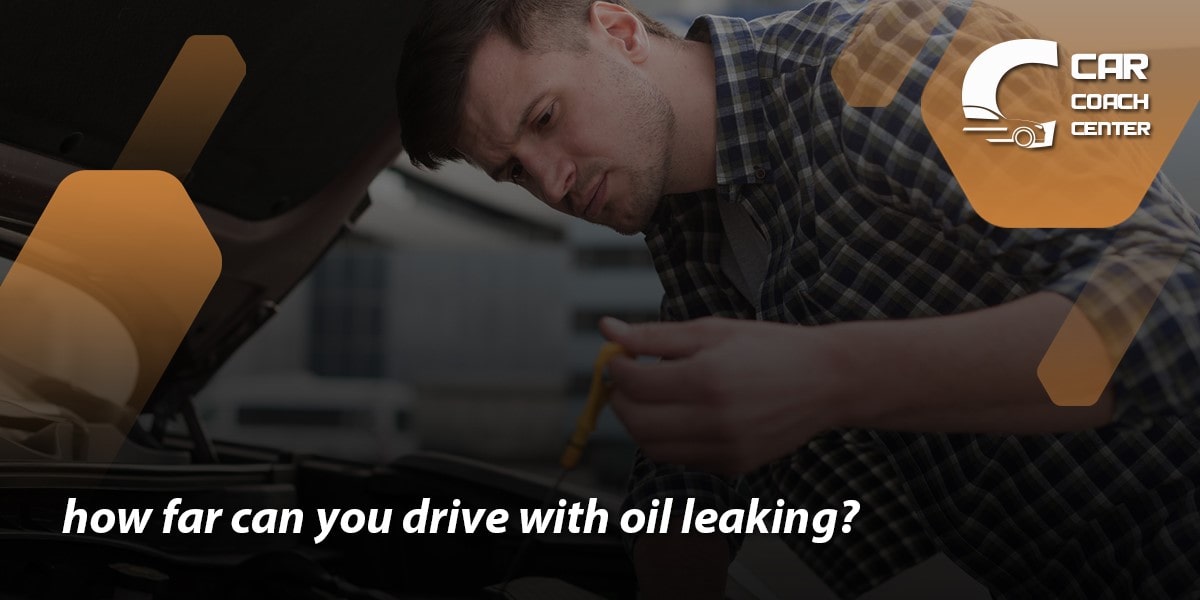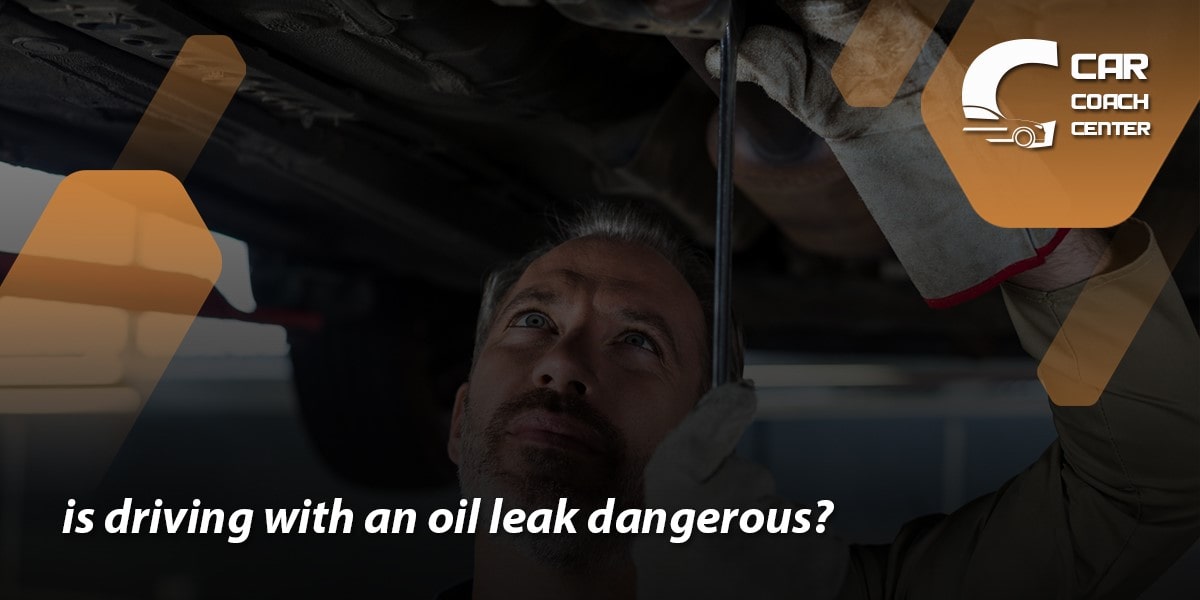Can You Drive A Car With an Oil Leak
Maintaining the health and longevity of your car requires diligent attention to various maintenance issues, and one crucial aspect is the condition of your engine’s oil. A car with an oil leak can present a significant concern for drivers, leading to many problems and potential hazards.
An oil leak indicates a loss of vital lubrication for the engine’s moving parts and can also serve as a symptom of more significant underlying issues. In this article, we will explore the question, “Can I drive a car with an oil leak?” and the various aspects surrounding this concern
We will examine the dangers of neglecting an oil leak, identify common signs to look out for, understand the causes and types of oil leaks, assess their severity, discuss potential DIY solutions for minor leaks, and emphasize the importance of timely professional repairs. By understanding the implications of driving with an oil leak, you can make informed decisions about your vehicle’s maintenance and ensure its optimal performance and safety on the road.

The Dangers of Ignoring an Oil Leak
When faced with an oil leak, it may be tempting to ignore it, especially if it appears minor or doesn’t affect the car’s immediate performance. However, disregarding an oil leak can severely affect your vehicle and safety. Here are some of the dangers associated with ignoring an oil leak:
Engine Damage
Oil is vital for lubricating the engine’s moving parts, reducing friction, and preventing excessive heat buildup. When there’s a leak, the oil level decreases, leading to inadequate lubrication. As a result, the engine components can grind against each other, causing premature wear and damage. Over time, this can lead to expensive repairs or even the need for an entirely new engine.
Reduced Performance
Insufficient lubrication affects the engine’s overall performance. The lack of proper lubrication can increase friction and heat, leading to decreased power output, reduced fuel efficiency, and diminished acceleration. Ignoring an oil leak may eventually result in a noticeable drop in your vehicle’s performance, making it sluggish and less responsive on the road.
Risk of Engine Failure
If an oil leak goes unaddressed, it can lead to catastrophic engine failure. As the oil level decreases, the engine becomes more prone to overheating. Excessive heat can cause critical engine components, such as pistons, valves, or bearings, to seize or warp. Engine failure can leave you stranded on the road, necessitating expensive repairs or rendering the vehicle unusable.
Safety Hazards
An oil leak can create safety hazards on the road. If oil drips onto the exhaust system or other hot engine components, it can ignite, potentially causing a fire. Also, leaking oil can create slick patches on the road, increasing the risk of skidding and losing control, especially in wet or slippery conditions.
Ignoring an oil leak puts your vehicle at risk and endangers the safety of yourself, your passengers, and other motorists.
Identifying Common Signs of an Oil Leak
Recognizing the signs of an oil leak is crucial for prompt detection and addressing the issue before it worsens. Here are some common signs to look out for:
Oil Puddles or Stains
One of the most obvious signs of an oil leak is the presence of oil puddles or stains beneath your parked car. If you notice dark, greasy spots on your driveway or parking spot, your vehicle is likely experiencing an oil leak. Pay attention to the color and consistency of the fluid, as engine oil is typically brown or black and has a slippery texture.
Burning Smell
An oil leak can cause the oil to come into contact with hot engine components, resulting in a distinct burning smell. If you notice a strong odor of burning oil while driving or when you exit the vehicle, it clearly indicates a potential oil leak.

Warning Lights
Modern cars have warning lights on the dashboard to alert drivers of various issues. If your oil pressure warning light illuminates, it could indicate a problem with your oil system, including a leak. Take this warning seriously and have your vehicle inspected as soon as possible.
Smoke or Steam
Oil leaking onto hot engine parts can produce smoke or steam under the hood. If you notice smoke or steam emanating from the engine compartment, pull over and investigate the source immediately. Driving in such conditions can lead to further damage and potential safety hazards.
Unusual Engine Behavior
An oil leak can affect your engine’s performance and behavior. Observing unusual engine symptoms such as rough idling, decreased power, or increased engine noise may indicate an oil leak compromising the engine’s functionality.
Reduced Oil Levels
Regularly checking your vehicle’s oil levels can help you detect an oil leak. If the oil level has significantly decreased between oil changes, it could indicate a leak. Remember that a gradual decrease in oil level over time is normal, but a sudden or significant drop requires immediate attention.
Causes and Types of Oil Leaks
Oil leaks can occur for various reasons, and understanding the causes and types of oil leaks can help you identify the source of the problem and take appropriate action. Here are some common causes and types of oil leaks:
Worn Gaskets and Seals
Gaskets and seals are crucial components that help create a tight seal between different engine parts. Over time, these gaskets and seals can deteriorate, crack, or become worn out, leading to oil leaks. Common areas where gaskets and seals can fail include the valve cover gasket, oil pan gasket, and camshaft seals.
Degraded or Damaged Oil Filters
The oil filter plays a vital role in removing contaminants from the engine oil to ensure its cleanliness. If the oil filter becomes degraded or damaged, it can develop leaks, allowing oil to escape. Regularly replacing the oil filter during routine maintenance helps prevent this oil leak.
Loose or Faulty Oil Drain Plug
During an oil change, the drain plug is removed to drain the old oil. If the drain plug is not properly tightened or the washer/seal is damaged, it can result in an oil leak. Checking the tightness of the oil drain plug after an oil change is essential to prevent leaks.
Cracked or Damaged Oil Pan
The oil pan is located at the bottom of the engine and holds the engine oil. It is susceptible to damage from debris on the road or impact from objects. A cracked or damaged oil pan can lead to oil leaks, requiring replacing or repairing the oil pan.
Engine Component Failures
Certain engine components, such as the oil cooler, oil pressure sender, or oil filter housing, can develop cracks or experience failures, leading to oil leaks. These types of leaks may require specialized repairs or component replacements.
Overfilling of Engine Oil
Adding too much oil during an oil change can cause excess pressure within the engine. This increased pressure can result in oil leaks as the excess oil finds pathways to escape. It is important to follow the manufacturer’s guidelines for oil capacity and avoid overfilling.
Assessing the Severity of an Oil Leak
When confronted with an oil leak, assessing its severity is important to determine the appropriate course of action. Here are some factors to consider when evaluating the seriousness of an oil leak:
Leak Rate
Observe the rate at which oil is leaking from your vehicle. A slow, minor drip may be less urgent than a rapid, steady flow. A significant leak requires immediate attention to prevent further damage to the engine.
Oil Level
Check your vehicle’s oil level regularly. If the oil level consistently drops below the recommended range, it indicates a more significant leak that needs to be addressed promptly. Low oil levels can lead to insufficient lubrication and potential engine damage.

Duration
Consider how long the oil leak has been present. A recent and sudden oil leak might require immediate action, while a minor leak that has existed for some time could still necessitate repairs but may allow for a more measured response.
Visual Inspection
Conduct a visual inspection of the leaking area. Assess the size of the oil puddles or stains on the ground beneath your vehicle. Additionally, check for signs of oil splatter or accumulation on engine components, which can indicate the extent and potential reach of the leak.
Engine Behavior
Pay attention to any changes in your engine’s performance or behavior. Unusual sounds, vibrations, or decreased power may indicate that the oil leak affects critical engine components. If the leak is causing engine problems, immediate action is advisable.
Safety Concerns
Evaluate whether the oil leak poses safety hazards. If the leaking oil is contacting hot engine parts and causing smoke or the risk of fire, or if the oil is creating slippery conditions on the road, it is crucial to address the leak promptly to mitigate potential accidents or damage.
Potential DIY Solutions for Minor Oil Leaks
If you’ve discovered a minor oil leak in your vehicle, there are a few do-it-yourself (DIY) solutions you can attempt to address the issue. However, it’s important to note that these solutions are temporary and may only provide a short-term fix. Here are some potential DIY solutions for minor oil leaks:
Oil Leak Stop Additives
Oil leak stop additives are designed to swell and rejuvenate gaskets and seals, potentially reducing or stopping minor leaks. These additives are typically poured into the engine oil during an oil change. However, it’s important to follow the instructions provided by the manufacturer and use products specifically designed for addressing oil leaks.
Tightening Loose Fasteners
Inspect the engine components for loose fasteners or fittings. If you find any, use the appropriate tools to tighten them securely. This includes checking the oil pan bolts, valve cover bolts, and other accessible fittings. Be cautious not to overtighten, as it can lead to damage or more significant leaks.
Gasket Sealants
Some minor leaks may be temporarily sealed using gasket or silicone-based sealants. These products can be applied to the affected gasket or seal area to provide a temporary seal. However, remember that this is not a permanent solution and should be considered a temporary fix until proper repairs can be made.
Replacing Worn-out Seals
If you have identified a specific seal causing the oil leak, such as a valve cover seal, consider replacing it yourself. Consult your vehicle’s service manual or reputable online resources for step-by-step instructions on removing and replacing the specific seal. Ensure you have the necessary tools and a replacement seal that matches the manufacturer’s specifications.

Monitoring Oil Levels
Regularly monitor your vehicle’s oil levels and top up as needed. This is important for maintaining proper lubrication and preventing engine damage. Regularly checking the oil level can identify if the leak is becoming more severe or if additional measures need to be taken.
The Importance of Timely Professional Repairs
When faced with an oil leak in your vehicle, seeking timely professional repairs is essential for several reasons. Here’s why it’s crucial to address oil leaks promptly with the help of a qualified mechanic:
Accurate Diagnosis
Professional mechanics have the expertise and diagnostic tools necessary to identify the source and cause of an oil leak accurately. They can thoroughly inspect the engine, gaskets, seals, and other components to pinpoint the exact location and severity of the leak. This ensures the correct repairs are carried out, preventing unnecessary and costly guesswork.
Preventing Further Damage
Ignoring an oil leak can lead to more significant engine damage over time. The lack of proper lubrication can cause increased friction and heat, leading to premature wear and potential failure of vital engine components. By addressing the oil leak promptly, professional repairs can prevent further damage, saving you from expensive repairs or even engine replacement in the future.
Long-Term Reliability
DIY solutions or temporary fixes for oil leaks may provide a short-term resolution, but they are not intended to be permanent solutions. On the other hand, professional repairs are designed to address the root cause of the leak and restore the integrity of the engine’s oil system. By having the leak professionally repaired, you can have confidence in your vehicle’s long-term reliability and performance.
Safety on the Road
Oil leaks can create safety hazards. Leaking oil can slippery the road surface, increasing the risk of accidents. Additionally, if oil comes into contact with hot engine parts, it can lead to smoke, fire, or even vehicle breakdowns in extreme cases. Professional repairs ensure your vehicle is safe to drive, reducing the risk of accidents or sudden engine failure.
Warranty and Resale Value
If your vehicle is under warranty, attempting DIY repairs or neglecting professional repairs may void the warranty. Professional repairs conducted by authorized technicians help preserve warranty coverage and protect your investment. Moreover, when it comes time to sell or trade in your vehicle, having a documented history of professional repairs and maintenance, including addressing oil leaks promptly, can enhance its resale value.
Peace of Mind
Finally, timely professional repairs offer peace of mind. Knowing that your vehicle has been thoroughly inspected and repaired by qualified professionals assures that the issue has been resolved correctly. You can confidently drive, knowing your vehicle is safe, reliable, and performing at its best.
Conclusion
In conclusion, driving a car with an oil leak can have serious consequences for your vehicle and your safety on the road. Understanding the dangers of ignoring an oil leak, identifying common signs, assessing the severity, and considering potential DIY solutions can provide valuable insights.
However, it is crucial to recognize the importance of timely professional repairs. Seeking the expertise of qualified mechanics ensures accurate diagnosis, prevents further damage, promotes long-term reliability, enhances safety, protects warranty coverage, and offers peace of mind.
CarCouchCenter.com is a valuable resource with additional information, expert advice, and professional services to address oil leaks and other maintenance needs. By prioritizing timely repairs and maintenance, you can safeguard your vehicle’s health, prolong its lifespan, and enjoy a safe and worry-free driving experience.
Can I drive my car with a minor oil leak?
It is generally not recommended to drive with a minor oil leak.
How can I identify an oil leak in my car?
Look for signs such as oil puddles or stains under the car, a burning smell, warning lights, smoke or steam, unusual engine behavior, or reduced oil levels.
Why is timely professional repair important for oil leaks?
Timely professional repairs are crucial because they provide an accurate diagnosis, prevent further damage, ensure long-term reliability, enhance safety, and protect warranty coverage.


